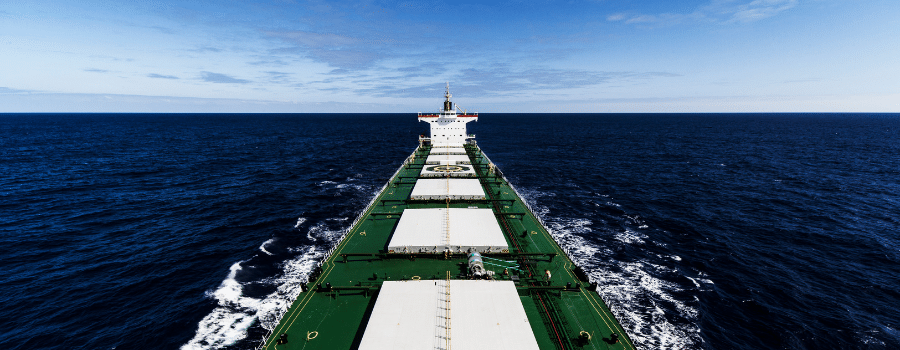Chartering, Freight Trading & Shipbroking
Opportunities in Chartering, Freight Trading & Shipbroking

Charterers and Freight Traders find cargo to put on ships and find ships to carry cargo.
Shipowners charter other owners’ ships and commodity groups charter ships to carry other commodity groups’ cargoes. Charterers have the market knowledge and contacts which enable them to hire in a ship for less than they can hire it out.
Freight trading, as distinct from chartering, is a high-risk and potentially high-reward business. It exposes the Trader to the freight risks faced by both shipowners and charterers and requires a deep understanding of the risks involved. Freight trading is often thought of as a tougher job than chartering. Some Freight Traders have clients who give them long-term cargo commitments, they have great broking relationships, and they understand where profit can be made from a ship or a cargo and where a poorly timed or poorly negotiated contract can lose it for them.
Shipbrokers are commercial staff who are the intermediaries between shipowners and the charterers who hire their ships. Known as Chartering Brokers (not to be confused with Charterers) or Competitive Shipbrokers, these Brokers earn a commission on the ‘freight’ paid per tonne to carry the cargo from A to B or on the daily ‘hire’ paid to hire the ship for a certain period.
Shipbrokers can also be the intermediaries between the buyers and sellers of ships, this is known as Sale & Purchase (S&P). These brokers earn a commission on the sale price of the ship.
A Shipbroker’s clients are the shipowners, charterers or the buyers & sellers of ships.
The majority of Shipbrokers specialise in particular vessel types and sizes and even in certain geographical trades. E.g. tanker, dry bulk, LNG, containers, chemicals/products, Handysize, Panamax, Atlantic, Pacific, etc.
Example Job Descriptions
Charterer
Chartering staff negotiate charterparties and find cargoes for ships, or find ships for cargoes, or execute orders given to them by freight trading colleagues.
Freight Trader
Freight Traders are found in many shipowners, pure operators, commodity companies and oil companies. If you charter-in ships and operate them for profit, you employ freight traders as well as charterers. Freight Traders are more than just ‘executors’ or ‘order-takers’. They are ‘developers’, ‘tonnage managers’, etc.
Freight Traders have the authority to go out and commit the company to cargo-carrying business even if the company does not own enough ships.
Shipbroker
Shipbrokers are the intermediaries between shipowners and charterer. Typical responsibilities would involve setting up and negotiating deals, including presenting the business to potential clients, negotiating the main terms of a contract, seeing it through to its conclusion and any follow-up.
Example Job Titles
Broker, Charterer, Chartering Broker, Chartering Manager, Chartering Officer, Competitive Broker, FFA Broker, Freight Trader, In-house Broker, Owner’s Broker, Principal Broker, S&P Broker, Shipbroker.
Where can I work as a Charterer, Freight Trader or Shipbroker?
Charterers and Freight Traders can be found in shipowners, ship operators, chartering houses and trading groups.
In addition to the above, Shipbrokers can be found in oil companies, power companies, commodity groups, mining groups, banks and of course shipbroking firms.
Charterers, Freight Traders and Brokers can be found globally, but major locations include Connecticut (USA), Copenhagen (Denmark), Geneva (Switzerland), Hong Kong, Houston (USA), London (UK), Oslo (Norway), and Singapore.
Key Skills and Experience
- Degrees in either business, maths, shipping or economics are seen as advantageous.
- People skills, networking skills and negotiating skills.
- Nowadays, most employers look for graduates, but some of the best brokers and charterers have no qualifications at all!
- The Institute of Chartered Shipbrokers (ICS) qualifications are highly regarded as on-the-job training and as a route into shipbroking and chartering.
Ready to search for your next career in Chartering, Freight Trading & Shipbroking?
Get in touch
To find out more about chartering, freight trading & shipbroking jobs, please get in touch with the team who specialise in these vacancies.
Real Life Stories from Marine Professionals
My name is Brian Yang from South Korea. I hold a Bachelor of Arts in Politics and International Relations from Thammasat University and a Master of Science in Maritime Transport Management, a dual degree from the University of Antwerp and Antwerp Management School.
I was passionate about international business development and encountered a right opportunity to join a shipping company. I began my career in a commercial role at a shipping company in South Korea and am now continuing this journey in Germany. Shipping is truly an international, relationship-based business.
If you enjoy meeting people, making international friends, and creating business opportunities from these connections, this is the best field to explore. Keep in mind that over 90% of global trade is conducted through seaborne transport. If you have the passion, dive in—you’ll gain invaluable experiences.
In shipping industry, there are many professionals with background of seafarers, but it is still open to any talents to join the industry regardless of their academic background. For my case, I also studied political science and that was how I started my career in shipping.
If anyone has passion in the frontline of global trading and shipping industry, they are never late to join the industry. Knock the door and it will be opened.
SeungMyeong Yang
Senior Chartering Officer
Latest Chartering, Freight Trading & Shipbroking Roles
Did you know?
The anchor of a large ship can weigh over 20 tonnes—roughly the weight of four elephants!
Your CV, Your Success

Know someone perfect for a role?
Interview Success Guide

Liam has been instrumental in securing my next job. He has a good network and moves fast, providing the right guidance in the recruitment process. Straight shooter. Well done.